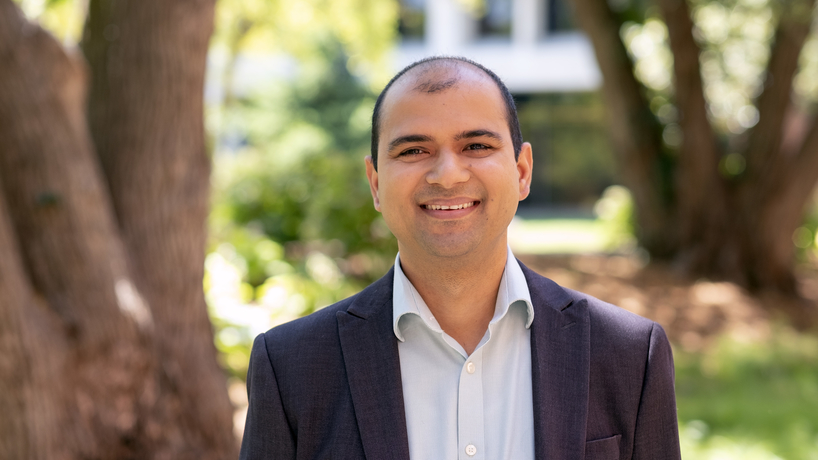
Badri Adhikari received a $160,000 grant from the National Science Foundation to research the use of artificial intelligence to create algorithms that predict the distance between protein pairs in amino acids. (Photo by August Jennewein)
When Badri Adhikari became interested in computer science as a teenager, he didn’t imagine he’d one day be researching health science – but that’s exactly what he’s doing now. Although he’d first been attracted to computer games, he realized his skills could help people become healthier and he loved the challenge of solving a difficult problem.
The assistant professor of computer science at the University of Missouri–St. Louis has been awarded a $160,000 grant from the National Science Foundation to investigate a bioinformatics problem known as protein distance prediction. His research focuses on protein folding, the process by which proteins form into shapes designed for specific biological tasks.
If proteins form incorrectly, they can cause a range of health problems. Adhikari’s research uses artificial intelligence to predict how proteins will fold, which could be used to address and stop potential issues.
His work focuses on protein distance, referring to how close protein pairs will be to each other in a sequence of amino acids. Using methods known as DEEPCON and PDNET, he’s developing algorithms to predict the distance between them – no small feat considering the infinite number of possibilities.
“This was selected as one of the top 100 unsolved problems by Science magazine,” he said. “It stands as one of the most notoriously challenging problems we have faced so far, and I’m interested in seeing how far AI can go to solve this problem.”
Adhikari has been testing a range of deep learning techniques to find the most accurate prediction method. ConvNet architecture appears especially promising as it predicts protein distance with more precision than methods that are currently used.
An increasing number of scientists, including Google researchers, are studying protein distance prediction, which Adhikari says creates more competition in the field but also leads to exciting ideas.
The grant-writing process was a challenge in itself. Adhikari had previously applied for a grant and did not receive funding, something he characterizes as a valuable learning experience. He credits the Office of Research Administration and Director of Research Development Cynthia Jobe for guiding him through the yearlong process that ultimately resulted in success.
“This grant has become the biggest motivation for me to continue my research because my ideas passed through an NSF panel of experienced researchers,” he said. “That means these ideas have the potential to transform science. What can be more encouraging than that?”
Adhikari’s path to a career in computer science began when he discovered the technology.
“I was in front of a computer for the first time when I was 16 years old,” he said. “It was love at first sight. At the time, I played a game and I felt like it was something worth exploring. I wanted to learn more about it and continuously got drawn into computer science.”
He earned his undergraduate degree at Tribhuvan University in Nepal and a PhD in computer science from the University of Missouri–Columbia. He accepted a position at UMSL after finishing his doctorate three years ago and has since collaborated with Missouri Institute of Mental Health Director Robert Paul, chemistry Professor James Bashkin and College of Education Assistant Professor Mary Edwin, along with other faculty members, to utilize AI methods to enhance research in their respective fields.
Adhikari feels grateful for the support provided by the UMSL community and administration. With the switch to remote learning, he’s especially thankful for Ken Voss, director of infrastructure services, and Philip Reiss, system administrator. They provided the IT support Adhikari needed to continue his research from home during the COVID-19 pandemic.
Throughout the summer, he’s concentrated on research, writing manuscripts and proposals and assisting graduate students with their projects. He’s especially passionate about working with computer science master’s students Matthew Bernardini and Bikash Shrestha to prepare for the CASP14 international competition. The three-month contest challenges participants to solve the issue of protein structure prediction and attracts teams from major companies such as Google.
Because computer science is a young field compared to English and math, Adhikari is enthusiastic about introducing students to the subject. One way he’s doing that is through the upcoming Artificial Intelligence and Deep Learning Club, which he’s designed to connect students from multiple disciplines.
“The club will be a place for students to network and learn about the potential and limitations of AI and deep learning,” he said. “Students from other disciplines can learn what computer science can do, what AI can do, what machine learning can do, and they can also contribute ideas. It’s a very interdisciplinary project.”
The first challenge Adhikari and the rest of the organization will tackle is stock price prediction. He’s hoping to connect students from economics, business, math and other subjects to work together to create and implement solutions.
In the long term, Adhikari plans to focus on applying AI and machine learning to human health and find ways to attract more students to pursue careers in computer science. Although he acknowledges that the field is challenging, he also points out that it’s rewarding as well and that consistently practicing new skills is the key to success.
“My advice to students is to keep learning,” he said. “In addition to doing the coursework and homework, find a video tutorial or a friend who knows programming and start practicing. Practice when you feel motivated, and practice when you don’t.”














